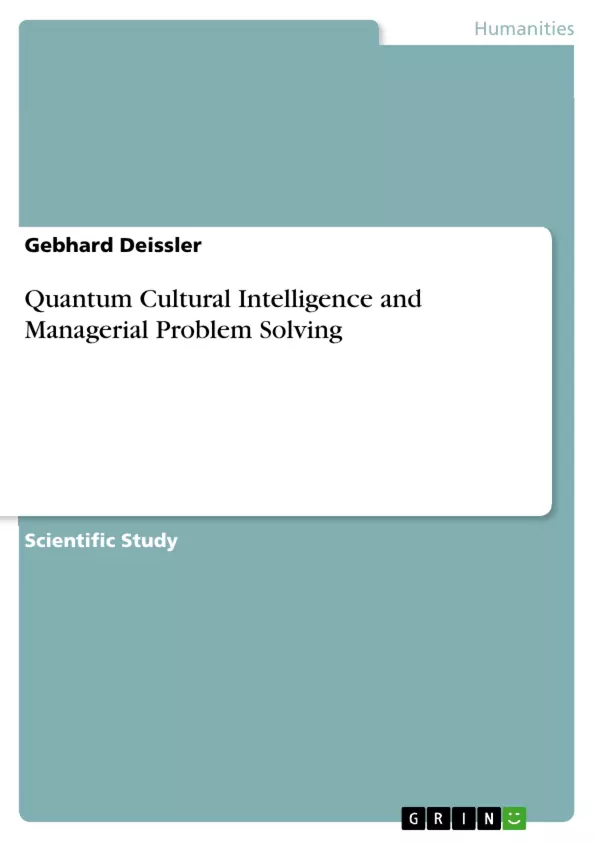The quantum metaphorical conceptualization of the world is derived from Heisenberg’s uncertainty principle and Bohr’s complementarity principle formulated in the first half of the past century. Both refer to the subatomic world and the understanding of matter and energy. The first postulates that one cannot determine the position and the momentum of a subatomic particle simultaneously. While one can be determined the other eludes and vice versa. The second is referred to as the wave-particle duality. It implies that matter and energy have two complementary aspects, i. e. particles or waves. Whether we consider God and man made in his likeness or the double helix of the DNA with its two strands or the millennia old Chinese yin-yang principle everywhere we find complementary realities that can more fully explain life: physical, biological, metaphysical, philosophical etc.
Inhaltsverzeichnis (Table of Contents)
- Quantum Cultural Intelligence and Managerial Problem Solving
- Interculturalism and its Blind Spots
- Towards a Quantum Cultural Intelligence
- The Axioms of Quantum Cultural Intelligence and its Practical Implications
- The Concept of Quantum Cultural Intelligence Applied to Management
- Summary
Zielsetzung und Themenschwerpunkte (Objectives and Key Themes)
This work explores the concept of quantum cultural intelligence and its potential to resolve cultural conflicts and foster peaceful coexistence. It argues that current intercultural approaches are insufficient and proposes a more holistic framework based on the inherent duality of human nature. The author aims to provide a practical and effective tool for navigating intercultural relations in the 21st century.
- Quantum Cultural Intelligence as a solution to cultural conflicts
- Limitations of traditional interculturalism
- The role of human duality in cultural understanding
- Axioms and practical implications of quantum cultural intelligence
- Applications of quantum cultural intelligence in management
Zusammenfassung der Kapitel (Chapter Summaries)
- This chapter introduces the concept of quantum cultural intelligence and its significance in fostering harmonious relationships at different levels, from interpersonal to intercivilisation. It emphasizes the importance of balancing cultural perspectives to avoid conflict and promote peaceful coexistence.
- This chapter criticizes the limitations of traditional interculturalism, arguing that it fails to address the fundamental duality of human nature, which contributes to cultural misunderstandings and conflicts.
- This chapter outlines the principles of quantum cultural intelligence, highlighting its ability to transcend cybernetic thinking by integrating and acknowledging the inherent duality of human beings.
- This chapter presents a set of axioms for managing intercultural relationships, derived from the principles of quantum cultural intelligence.
- This chapter demonstrates the practical application of quantum cultural intelligence in various management contexts, emphasizing its potential to improve communication, collaboration, and problem-solving in diverse teams and organizations.
Schlüsselwörter (Keywords)
This work explores the concepts of quantum cultural intelligence, intercultural management, transcultural management, cultural conflict resolution, human duality, cybernetic intelligence, and practical applications of these concepts in diverse fields, particularly in management.
Frequently Asked Questions
What is the core concept of Quantum Cultural Intelligence?
It is a metaphorical conceptualization of cultural relations derived from quantum physics principles, specifically Heisenberg’s uncertainty principle and Bohr’s complementarity principle.
How does quantum theory apply to human culture?
The author argues that human nature and energy have complementary aspects (like waves and particles), and understanding these dualities helps explain complex social and metaphysical life more fully.
What is the main criticism of traditional interculturalism in this text?
Traditional interculturalism is seen as insufficient because it fails to address the fundamental duality of human nature, leading to blind spots and conflicts.
How can Quantum Cultural Intelligence be applied to management?
It serves as a tool for resolving cultural conflicts and fostering peaceful coexistence in diverse teams by transcending linear, cybernetic thinking.
What are the practical benefits of this approach?
It provides axioms for managing intercultural relationships that help navigate relations in the 21st century more harmoniously.
- Quote paper
- D.E.A./UNIV. PARIS I Gebhard Deissler (Author), 2011, Quantum Cultural Intelligence and Managerial Problem Solving, Munich, GRIN Verlag, https://www.grin.com/document/169705



